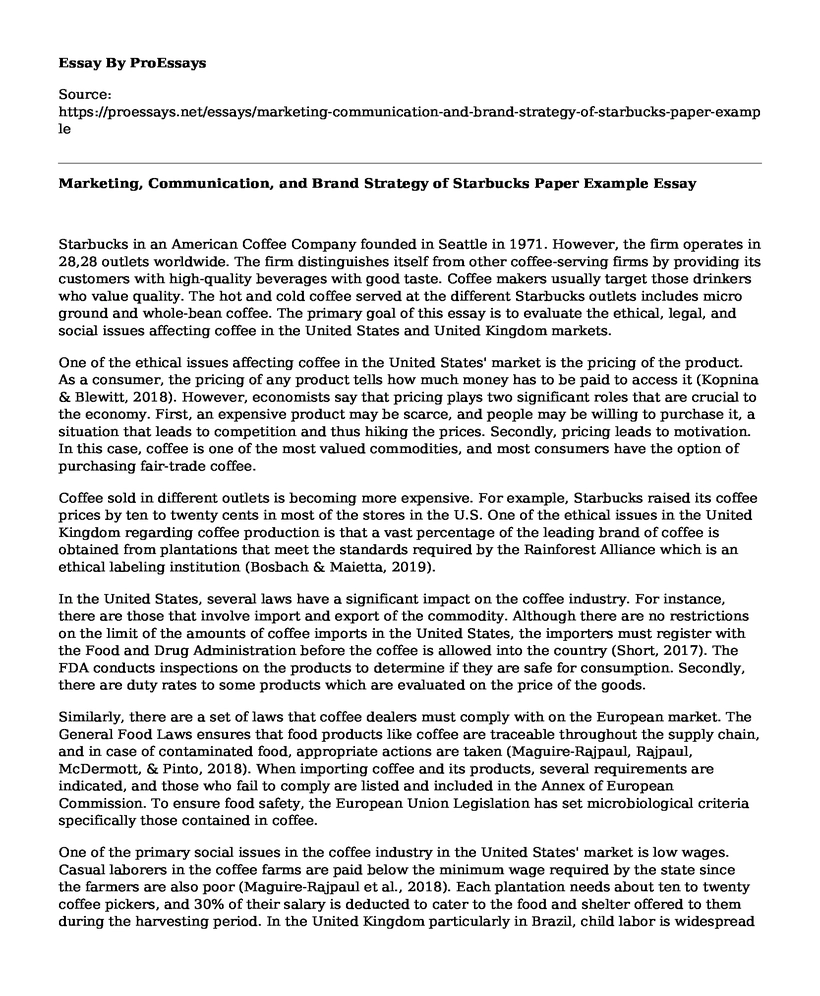Starbucks in an American Coffee Company founded in Seattle in 1971. However, the firm operates in 28,28 outlets worldwide. The firm distinguishes itself from other coffee-serving firms by providing its customers with high-quality beverages with good taste. Coffee makers usually target those drinkers who value quality. The hot and cold coffee served at the different Starbucks outlets includes micro ground and whole-bean coffee. The primary goal of this essay is to evaluate the ethical, legal, and social issues affecting coffee in the United States and United Kingdom markets.
One of the ethical issues affecting coffee in the United States' market is the pricing of the product. As a consumer, the pricing of any product tells how much money has to be paid to access it (Kopnina & Blewitt, 2018). However, economists say that pricing plays two significant roles that are crucial to the economy. First, an expensive product may be scarce, and people may be willing to purchase it, a situation that leads to competition and thus hiking the prices. Secondly, pricing leads to motivation. In this case, coffee is one of the most valued commodities, and most consumers have the option of purchasing fair-trade coffee.
Coffee sold in different outlets is becoming more expensive. For example, Starbucks raised its coffee prices by ten to twenty cents in most of the stores in the U.S. One of the ethical issues in the United Kingdom regarding coffee production is that a vast percentage of the leading brand of coffee is obtained from plantations that meet the standards required by the Rainforest Alliance which is an ethical labeling institution (Bosbach & Maietta, 2019).
In the United States, several laws have a significant impact on the coffee industry. For instance, there are those that involve import and export of the commodity. Although there are no restrictions on the limit of the amounts of coffee imports in the United States, the importers must register with the Food and Drug Administration before the coffee is allowed into the country (Short, 2017). The FDA conducts inspections on the products to determine if they are safe for consumption. Secondly, there are duty rates to some products which are evaluated on the price of the goods.
Similarly, there are a set of laws that coffee dealers must comply with on the European market. The General Food Laws ensures that food products like coffee are traceable throughout the supply chain, and in case of contaminated food, appropriate actions are taken (Maguire-Rajpaul, Rajpaul, McDermott, & Pinto, 2018). When importing coffee and its products, several requirements are indicated, and those who fail to comply are listed and included in the Annex of European Commission. To ensure food safety, the European Union Legislation has set microbiological criteria specifically those contained in coffee.
One of the primary social issues in the coffee industry in the United States' market is low wages. Casual laborers in the coffee farms are paid below the minimum wage required by the state since the farmers are also poor (Maguire-Rajpaul et al., 2018). Each plantation needs about ten to twenty coffee pickers, and 30% of their salary is deducted to cater to the food and shelter offered to them during the harvesting period. In the United Kingdom particularly in Brazil, child labor is widespread in coffee production where young children are pulled from school to work in the plantations. Workers are subjected to long hours of hard labor with little pay.
Conclusion
Marketing activities need several attempts to determine if they are worthwhile. The marketing activities should be repeated for some time before a decision is made. Developing a process to monitor and control marketing performance requires four crucial factors. One must be aware of the external factors influencing the industry. Some of these external factors include economic shifts and competitors. Secondly, cost-benefits must be considered. Thirdly, it is critical to have valid and reliable feedback mechanisms using data. However, it is essential to consider the cost of the feedback mechanisms since some are extremely expensive. Lastly, there must be a long-term perspective where one focusses on building long-term value.
References
Bosbach, M., & Maietta, O. W. (2019). The Implicit Price for Fair Trade Coffee: Does Social Capital Matter?. Ecological Economics, 158, 34-41.
Kopnina, H. P., & Blewitt, J. W. (2018). Business ethics. In Sustainable Business (Vol. 23, No. 45, pp. 23-45). ROUTLEDGE in association with GSE Research.
Maguire-Rajpaul, V. A., Rajpaul, V. M., McDermott, C. L., & Pinto, L. F. G. (2018). Coffee certification in Brazil: compliance with social standards and its implications for social equity. Environment, Development and Sustainability, 1-30.
Short, J. (2017). American Business and Foreign Policy: Cases in Coffee and Cocoa Trade Regulation 1961-1974. Routledge.
Cite this page
Marketing, Communication, and Brand Strategy of Starbucks Paper Example. (2022, Nov 20). Retrieved from https://proessays.net/essays/marketing-communication-and-brand-strategy-of-starbucks-paper-example
If you are the original author of this essay and no longer wish to have it published on the ProEssays website, please click below to request its removal:
- Marketing Essay Example: Launching New Product to the Market
- Digital Marketing Strategies Paper Example
- Amazon Acquisition of Whole Foods Paper Example
- Essay Sample on Public Relations Role in a Firm
- Humanitarian Crisis Relief: How NGOs Save Lives - Essay Sample
- Essay Example on Promotional Strategies: Red Bull vs Coca Cola
- Essay Example on Microsoft: Transforming Humanity's Future Through Cloud Tech







